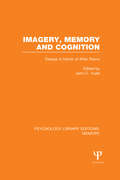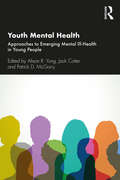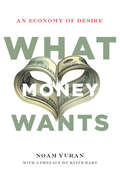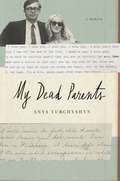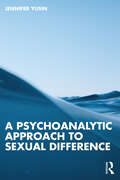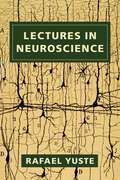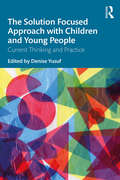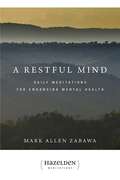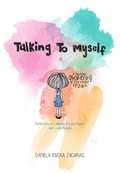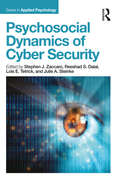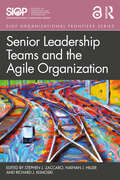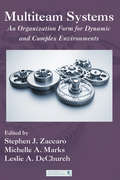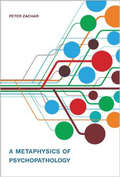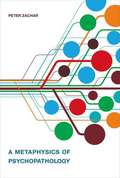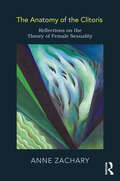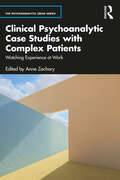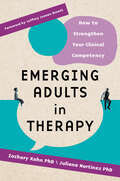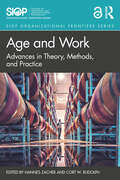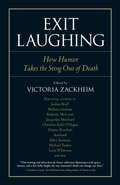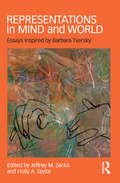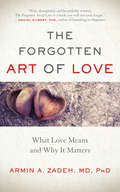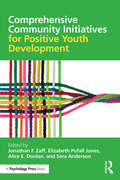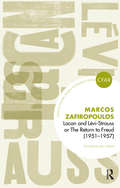- Table View
- List View
Imagery, Memory and Cognition: Essays in Honor of Allan Paivio (Psychology Library Editions: Memory)
by John C. YuilleOriginally published in 1983, the 14 chapters in this volume are based upon presentations made to a conference held at the University of Western Ontario in June, 1981. The primary purpose of that conference was to mark the 10th anniversary of the publication of Allan Paivio’s text, Imagery and Verbal Processes, and to acknowledge the continuing contribution that Paivio was making to imagery research and theory at the time. His landmark book had been the major publication in the field of imagery, and during the decade prior to this volume Paivio’s theorizing and research dominated the investigation of imaginal processes. It was felt the most appropriate way to honor his achievements and activities, was to hold a conference on current developments in imagery research and theory at the time.
Youth Mental Health: Approaches to Emerging Mental Ill-Health in Young People
by Alison R. Yung Jack Cotter Patrick D. McGorryThis book highlights the field of youth mental health and why it is a specialty distinct from both child and adolescent and adult mental health. Youth Mental Health: Approaches to Emerging Mental Ill-Health in Young People examines issues such as mental health literacy, e-Health, family, psychological, vocational and pharmacological interventions. The authors also discuss issues that are particularly pertinent to young people, such as suicidality, substance abuse, gender identity and sexuality, attention deficit disorder and eating disorders. Taking a preventative focus, this book presents evidence for youth mental health as an important and growing field, makes the case for the reform of existing service structures to better serve this group and outlines the latest specialised approaches to treatment. Drawing on the knowledge and expertise of leading thinkers in youth mental health, this book is instrumental for mental health professionals who wish to design new specialised mental health systems for young people.
What Money Wants: An Economy of Desire
by Noam YuranOne thing all mainstream economists agree upon is that money has nothing whatsoever to do with desire. This strange blindness of the profession to what is otherwise considered to be a basic feature of economic life serves as the starting point for this provocative new theory of money. Through the works of Karl Marx, Thorstein Veblen, and Max Weber, What Money Wants argues that money is first and foremost an object of desire. In contrast to the common notion that money is but an ordinary object that people believe to be money, this book explores the theoretical consequences of the possibility that an ordinary object fulfills money's function insofar as it is desired as money. Rather than conceiving of the desire for money as pathological, Noam Yuran shows how it permeates economic reality, from finance to its spectacular double in our consumer economy of addictive shopping. Rich in colorful and accessible examples, from the work of Charles Dickens to Reality TV and commercials, this book convinces us that we must return to Marx and Veblen if we are to understand how brand names, broadcast television, and celebrity culture work. Analyzing both classical and contemporary economic theory, it reveals the philosophical dimensions of the controversy between orthodox and heterodox economics.
My Dead Parents: A Memoir
by Anya YurchyshynA haunting, unforgettable family story about hidden secrets and a daughter’s journey to understand her parents Anya Yurchyshyn grew up in a narrow townhouse in Boston, every corner filled with the souvenirs of her parents’ adventurous international travels. On their trips to Egypt, Italy, and Saudi Arabia, her mother, Anita, and her father, George, lived an entirely separate life from the one they led as the parents of Anya and her sister – one that Anya never saw. The parents she knew were a brittle, manipulative alcoholic and a short-tempered disciplinarian: people she imagined had never been in love. When she was sixteen, Anya’s father was killed in a car accident in Ukraine. At thirty-two, she became an orphan when her mother drank herself to death. As she was cleaning out her childhood home, she suddenly discovered a trove of old letters, photographs, and journals hidden in the debris of her mother’s life. These lost documents told a very different story than the one she’d believed to be true – of a forbidden romance; of a loving marriage, and the loss of a child. With these revelations in hand, Anya undertook an investigation, interviewing relatives and family friends, traveling to Wales and Ukraine, and delving deeply into her own difficult history in search of the truth, even uncovering the real circumstances of her father’s death – not an accident, perhaps, but something more sinister. In this inspiring and unflinchingly honest debut memoir, Anya interrogates her memories of her family and examines what it means to be our parents’ children. What do we inherit, and what can we choose to leave behind? How do we escape the ghosts of someone else’s past? And can we learn to love our parents not as our parents, but simply as people? Universal and personal; heartbreaking and redemptive, My Dead Parents helps us to see why sometimes those who love us best hurt us most.
A Psychoanalytic Approach to Sexual Difference
by Jennifer YusinA Psychoanalytic Approach to Sexual Difference analyzes the concepts of sex and gender, showing how sexual difference is characterized by ongoing transformations of spatiality and body, and of essentiality and normativity. In this book, Jennifer Yusin presents a psychoanalytic study that engages with clinical cases, philosophies of sex and gender, and psychoanalytic writings about sexual difference. She deftly and accessibly analyzes Freud’s and Lacan’s work on feminine sexuality, Winnicott’s notion of the transitional object, and theories of sexuality and gender developed by Judith Butler and Monique Wittig, among others. Yusin starts with the question of how the lack of any essential definition of sexual difference affects subjectivity. She places an emphasis on the psychoanalytic experience and its effects upon how a subject experiences the difference between being a body and having a body. Following Lacan’s discovery of the Borromean knot structure of the unconscious and the work of the psychoanalyst Jean-Gérard Bursztein, Yusin continues developing subjective topology as a methodology. She also introduces and shows how sexual difference is linked to transformations of sex and body. Through this, Yusin highlights how it is necessary to reformulate sex, gender, and sexual identities in psychoanalytic theories and in the practice of psychoanalysis. She also speaks to the necessity of generating a new lexicon to help analysts speak about sexual difference in ways that do not perpetuate any essentialism or normativity on the topic. This book is essential reading for clinicians in psychoanalysis, mental health practitioners in the trans field, and academics working in gender theory, queer and trans studies, and feminist philosophies.
A Psychoanalytic Approach to Sexual Difference
by Jennifer Yusin1. This book presents an original analysis of sexual difference, emphasising the psychoanalytic experience and its effects upon how a subject experiences the difference between being a body and having a body; 2. Yusin elucidates this potentially muddied (?) area with an approachable writing style, highlighting the tools contemporary analysts need to advance their own notions of sex and gender, as well as how to update their lexicon and approach to the topic; 3. Throughout, Yusin draws on the psychoanalytic theories of Freud, Lacan and Winnicott, as well as theories of sexuality and gender developed by Michel Foucault, Judith Butler and Jack Halberstam;
Lectures in Neuroscience
by Rafael YusteThe human brain is perhaps the most intricate and fascinating object in the known universe. Through a mysterious process, the activity of billions of neurons within a few pounds of matter generates the unfathomable complexity of the mind.This book is a conversational and accessible introduction to the brain. Beginning from basic elements of neuroscience, the acclaimed scientist Rafael Yuste guides readers through increasingly sophisticated topics, developing a unified framework for how the brain functions. He describes how the brain is organized and how it develops, how neurons operate and form neural circuits, and how these circuits function as neural networks to generate behavior and mental states.Yuste challenges the traditional view that the brain is an input-output machine that reacts reflexively to sensory stimuli. Instead, he argues, the purpose of the brain is to make a predictive model of the world in order to anticipate the future and choose successful courses of action. He gives readers insight into the workings of sensory and motor systems and the neurobiological basis of our perceptions, thoughts, emotions, memories, and consciousness.Peppered with anecdotes and illustrated with elegant drawings and diagrams, this succinct and cohesive book is accessible to readers without previous background in the subject. It is written for anyone seeking to grasp the core principles of neuroscience or looking for a fresh and clear perspective on how the brain works.
The Solution Focused Approach with Children and Young People: Current Thinking and Practice
by Denise YusufThe Solution Focused Approach with Children and Young People: Current Thinking and Practice brings together leading figures and innovative practitioners from different professions, contexts and countries to provide a unique overview of Solution Focused work with children and young people. Presenting a range of applications in individual, group and community work, it puts the spotlight on diverse fields, exploring how the Solution Focused approach can work in real-world contexts. This book showcases a powerful, engaging approach which helps children and young people find the resources and strengths to manage difficulties and make the most of their lives. It contains interesting case studies, narrative descriptions of original practice, programmes of work developed using Solution Focused principles, and thought-provoking discussions of key elements of practice. With chapters presenting perspectives from coaching, therapy, consultancy and education, and applications including learning assessments, child protection, bereavement, edge of care, and youth offending, the book provides an overview of the current state of practice and provides pointers to potential new developments. The Solution Focused Approach with Children and Young People will help both experienced practitioners and those new to the approach to develop and update their knowledge and skills, as well as introducing them to creative and cutting-edge tools to inspire fresh ideas and thinking. It will be essential reading for Solution Focused practitioners and students, as well as coaches, social workers, school counsellors and mental health professionals working with children and young people.
A Restful Mind: Daily Meditations for Enhancing Mental Health
by Mark Allen ZabawaThe only meditation book designed to provide inspiration, support, and focus for those living with mental health problems.With A Restful Mind, Mark Allen Zabawa offers the first book designed to provide inspiration and support specifically for people living with mental health problems. A year of daily readings address the common life issues that arise for those with mental health problems and help those dealing with a disorder start or end each day more at peace with themselves and the world. By focusing thinking on positive, health-enhancing messages and presenting the kind of empathetic support that fellow contenders of emotional distress can offer, these meditations help you achieve the mental rest and self-acceptance needed for a balanced, healthy mind and peaceful life.
Talking to Myself: Reflections on Learning to Love Myself and Living Bravely
by Daníela Rivera ZacaríasDaníela Rivera Zacarías believes everything happens for a reason, even if we cannot see it at the moment. This book began as her personal journal, her own attempt to discover her place in the world through analyzing experiences, relationships, and spiritual encounters. It evolved into a book—and then the beloved Hablando Sola brand with more than 2,100,000 Facebook likes—full of thoughtful questions and meaningful reflections that has inspired and uplifted hundreds of thousands of young people in Latin America. Now the book that has sold more than 200,000 copies in Latin America is available in English, coinciding with the brand’s expansion into the United States as Talking to Myself.Zacarías guides readers on their own self-discovery journeys through simple, accessible musings and anecdotes. "How do you learn to love yourself?” she asks and then continues, "I think it’s impossible if you don’t know who you are.” The ensuing chapters include Love, Fear, God, Art, Beauty, Depression, Happiness, and more, tackling a wide range of subjects with one goal in mind: helping readers to better know themselves, that they might better love themselves.This book comes alongside you like a big sister who’s been there and done that and can impart her wisdom between warm hugs and a few laughs. It will be of special interest to the 54 million Hispanic Americans in the United States because of Zacarías’s following in Latin America, but its honesty, warmth, and wisdom will give it broad appeal, particularly to young women.
Psychosocial Dynamics of Cyber Security (Applied Psychology Series)
by Stephen J. Zaccaro Reeshad S. Dalal Lois E. Tetrick Julie A. SteinkeThis new volume, edited by industrial and organizational psychologists, will look at the important topic of cyber security work in the US and around the world. With contributions from experts in the fields of industrial and organizational psychology, human factors, computer science, economics, and applied anthropology, the book takes the position that employees in cyber security professions must maintain attention over long periods of time, must make decisions with imperfect information with the potential to exceed their cognitive capacity, may often need to contend with stress and fatigue, and must frequently interact with others in team settings and multiteam systems. Consequently, psychosocial dynamics become a critical driver of cyber security effectiveness. Chapters in the book reflect a multilevel perspective (individuals, teams, multiteam systems) and describe cognitive, affective and behavioral inputs, processes and outcomes that operate at each level. The book chapters also include contributions from both research scientists and cyber security policy-makers/professionals to promote a strong scientist-practitioner dynamic. The intent of the book editors is to inform both theory and practice regarding the psychosocial dynamics of cyber security work.
Senior Leadership Teams and the Agile Organization (SIOP Organizational Frontiers Series)
by Stephen J. Zaccaro Nathan J. Hiller Richard J. KlimoskiSenior Leadership Teams and the Agile Organization builds on existing knowledge in the leadership, teams, and strategic management literatures to examine and explore how senior leadership teams drive the dynamic capabilities of organizations. Organizational agility is a key dimension of organizational performance. This volume focuses on senior leadership team processes and attributes that facilitate organizational agility and the organization’s capacity to perform and rapidly pivot in response to shifting strategic demands. Chapters summarize the current state of knowledge, examine past research and theory, define research and theoretical gaps, and consider how to address these gaps. In so doing, they offer an understanding of how senior leadership teams drive and enable organizational activity. The book is essential reading for researchers and professionals looking to understand the intersection of leadership, team dynamics, organizational psychology, organizational psychology, and strategic management, particularly in relation to organizational agility and the senior leadership team.
Multiteam Systems: An Organization Form for Dynamic and Complex Environments (Organization and Management Series)
by Stephen J. Zaccaro Michelle A. Marks Leslie A. DeChurchThis book examines an emerging organizational form called the multi-team system (MTS). This type of aggregation is being increasingly adopted by organizations and agencies that need to respond to complex strategic problems. There has been increasing interest in MTSs over the last decade to the point where there is now a need to (a) describe these organizational forms more fully, (b) build conceptual frames that can guide research, and (c) begin developing tools to improve the study of MTSs. The purpose of this book is to respond to these needs. The book contains a series of chapters that expand prior conceptual frames of MTSs, defining in more detail the compositional and linkage attributes that characterize such units. The book also explores how such systems emerge and develop, as well as the methods for studying MTSs. The intent of the book is to establish and nurture a strong conceptual and methodological foundation that can guide research and practice with MTSs. Because the notion of MTSs cuts across multiple domains, this book will interest scholars in industrial/organizational psychology, organizational science, management and organizational theory, human factors, sociology, organization communications, and public administration.
A Metaphysics of Psychopathology (Philosophical Psychopathology)
by Peter ZacharAn exploration of what it means to think about psychiatric disorders as “real,” “true,” and “objective” and the implications for classification and diagnosis.In psychiatry, few question the legitimacy of asking whether a given psychiatric disorder is real; similarly, in psychology, scholars debate the reality of such theoretical entities as general intelligence, superegos, and personality traits. And yet in both disciplines, little thought is given to what is meant by the rather abstract philosophical concept of “real.” Indeed, certain psychiatric disorders have passed from real to imaginary (as in the case of multiple personality disorder) and from imaginary to real (as in the case of post-traumatic stress disorder). In this book, Peter Zachar considers such terms as “real” and “reality”—invoked in psychiatry but often obscure and remote from their instances—as abstract philosophical concepts. He then examines the implications of his approach for psychiatric classification and psychopathology.Proposing what he calls a scientifically inspired pragmatism, Zachar considers such topics as the essentialist bias, diagnostic literalism, and the concepts of natural kind and social construct. Turning explicitly to psychiatric topics, he proposes a new model for the domain of psychiatric disorders, the imperfect community model, which avoids both relativism and essentialism. He uses this model to understand such recent controversies as the attempt to eliminate narcissistic personality disorder from the DSM-5. Returning to such concepts as real, true, and objective, Zachar argues that not only should we use these metaphysical concepts to think philosophically about other concepts, we should think philosophically about them.
A Metaphysics of Psychopathology
by Peter ZacharIn psychiatry, few question the legitimacy of asking whether a given psychiatric disorder is real; similarly, in psychology, scholars debate the reality of such theoretical entities as general intelligence, superegos, and personality traits. And yet in both disciplines, little thought is given to what is meant by the rather abstract philosophical concept of "real." Indeed, certain psychiatric disorders have passed from real to imaginary (as in the case of multiple personality disorder) and from imaginary to real (as in the case of post-traumatic stress disorder). In this book, Peter Zachar considers such terms as "real" and "reality" -- invoked in psychiatry but often obscure and remote from their instances -- as abstract philosophical concepts. He then examines the implications of his approach for psychiatric classification and psychopathology. Proposing what he calls a scientifically inspired pragmatism, Zachar considers such topics as the essentialist bias, diagnostic literalism, and the concepts of natural kind and social construct. Turning explicitly to psychiatric topics, he proposes a new model for the domain of psychiatric disorders, the imperfect community model, which avoids both relativism and essentialism. He uses this model to understand such recent controversies as the attempt to eliminate narcissistic personality disorder from the DSM-5. Returning to such concepts as real, true, and objective, Zachar argues that not only should we use these metaphysical concepts to think philosophically about other concepts, we should think philosophically about them.
The Anatomy of the Clitoris: Reflections on the Theory of Female Sexuality
by Anne ZacharyIn the long and passionate debate within psychoanalysis over the theory of female sexuality, which has spanned more than a century and reached no definitive conclusion, a pattern of non-acceptance of ideas, their disappearance and then re-emergence later is a continually repeating one. The Anatomy of the Clitoris shows how this happens, using a comprehensive guide to the literature. The time is right culturally to explore this further usingclinical material as illustration. The central aim of this book is to introduce recent innovative redrawing of female anatomy appearing in the scientific literature to psychoanalysis.
Clinical Psychoanalytic Case Studies with Complex Patients: Watching Experience at Work (The\psychoanalytic Ideas Ser.)
by Anne ZacharyClinical Psychoanalytic Case Studies with Complex Patients is a collection of key case studies that provides a rich resource of information and inspiration for clinicians working psychoanalytically with complex and disturbed patients in a range of contexts. The book is presented in six parts, each introduced with commentary that puts the material into context. It covers a range of topics including autism, violence and perversion, psychosomatics, hysteria, dementia, psychosis and assessment of gender dysphoria. Each chapter presents either a single case study or a selection of case vignettes, examines necessary context and presents additional detail about subsequent treatment. The depth and range of the cases presented provide key insight into and detailed consideration of risk assessment, safe settings and other important preliminary issues. Clinical Psychoanalytic Case Studies with Complex Patients will be of great interest to psychoanalysts in practice and in training, psychoanalytic psychotherapists and other clinicians seeking an introduction to psychoanalytic work.
Emerging Adults in Therapy: How to Strengthen Your Clinical Competency
by Zachary Kahn and Juliana MartínezTheoretical, sociocultural, and clinical essays on the psychology of today’s young adults. “Emerging adulthood” (EA) describes a developmental period between adolescence and adulthood, typically spanning ages 18–29. It’s a rough time for most people—perhaps now more than ever. Emerging Adults in Therapy contains contributions from various psychologists and psychiatrists (many of whom are on the younger side), with diverse backgrounds and specialties related to EA. The book’s editors, Zachary Kahn and Juliana Martinez, are both licensed psychologists in New York working predominantly with young adults in private practice. Much of the focus here is on the psychological impacts of the COVID-19 pandemic and the reckoning on racial injustice that characterize this time period. Other sections discuss theories of this age band and describe different treatment approaches specialized for young adults. This book should appeal to training and practicing clinicians working with young people, as well as young adults and their parents who are interested in both the psychological challenges and therapeutic practices that can help. Contributors include: Francis Bartolomeo · Anna-Lee Stafford · Andrew Gerber · Steve Tuber · Karen Tocatly · Chantel T. Ebrahimi · Alexandria G. Bauer · Denise Hien · Lillian Polanco-Roman · Marjorine Henriquez-Castillo · Kathleen Isaac · Elisa Lee · Carolina Franco · Annelisa Pedersen · Peter Lemons · Elizabeth F. Baumann · Zoe Berko · Leora Trub · Vendela Parker · Zachary Geller · Danielle La Rocco · Kristin P. Wyatt · Colleen M. Cowperthwait · Kateri Berasi · Sherina Persaud
Age and Work: Advances in Theory, Methods, and Practice (SIOP Organizational Frontiers Series)
by Hannes Zacher Cort W. RudolphThe edited volume Age and Work: Advances in Theory, Methods, and Practice presents a systematic collection of key advances in theory, methods, and practice regarding age(ing) and work. This cutting-edge collection breaks new ground by developing novel and useful theory, explaining underutilized but important methodological approaches, and suggesting original practical applications of emerging research topics. The book begins with a prologue by the World Health Organization’s unit head for aging and health, an introduction on the topic by the editors, and an overview of past, current, and future workforce age trends. Subsequently, the first main section outlines theoretical advances regarding alternative age constructs (e.g., subjective age), intersectionality of age with gender and social class, paradoxical age-related actions, generational identity, and integration of lifespan theories. The second section presents methodological advances regarding behavioral assessment, age at the team and organizational levels, longitudinal and diary methods, experiments and interventions, qualitative methods, and the use of archival data. The third section covers practical advances regarding age and job crafting, knowledge exchange, the work/nonwork interface, healthy aging, and absenteeism and presenteeism, and organizational meta-strategies for younger and older workers. The book concludes with an epilogue by an eminent scholar in age and work. Written in a scientific yet accessible manner, the book offers a valuable resource for undergraduate and graduate students, academics in the fields of psychology and business, as well as practitioners working in the areas of human resource management and organizational development.
Exit Laughing
by Victoria ZackheimExit Laughing is more than a collection of twenty-four personal stories, written by some of our country's finest authors, on the subject of death and humor. It's a reminder that all of us approach death in very different ways. Whether we face our death or the death of a loved one with fear, sorrow, joy, or confusion, and whether or not we believe in an afterlife, we cannot deny that death happens. Exit Laughing reminds us that in death there is a place for humor. Ellen Sussman writes of flying home her mother's body and watching her mother's burial wardrobe spill out on the baggage carousel. Kathi Kamen Goldmark regales us with memories of playing the kazoo at Jessica Mitford's funeral. Broadway and television actor Richard McKenzie shares the riotous story of a funeral procession led by a lost hearse. Bonnie Garvin writes about her parents' double suicide attempt (and yes, it's funny!). Joshua Braff recalls a death in an upstairs bedroom during his childhood, Roadrunner cartoons included. L.A. Law star and author Michael Tucker describes his last visit with his dying friend, Cleavon Little, and how they said goodbye. International bestselling novelist Jacquelyn Mitchard writes about her husband's untimely death, and how his three best friends ended up held in a psychiatric hospital after the wake. These stories, along with seventeen other memorable essays, constitute a book whose purpose is to remind readers that when dealing with illness, dying, and death, there is an important place for laugh-out-loud humor.
Representations in Mind and World: Essays Inspired by Barbara Tversky
by Jeffrey M. Zacks Holly A. TaylorThis volume pulls together interdisciplinary research on cognitive representations in the mind and in the world. The chapters—from cutting-edge researchers in psychology, philosophy, computer science, and the arts—explore how structured representations determine cognition in memory, spatial cognition information visualization, event comprehension, and gesture. It will appeal to graduate-level cognitive scientists, technologists, philosophers, linguists, and educators.
The Forgotten Art of Love: What Love Means and Why It Matters
by Armin A. ZadehExplore the many facets of our most valued emotion Cardiologist and professor Armin Zadeh revisits psychologist Erich Fromm’s The Art of Loving, a book that has fascinated him for decades. The Forgotten Art of Love examines love in its complex entirety — through the lenses of biology, philosophy, history, religion, sociology, and economics — to fill in critical voids in Fromm’s classic work and to provide a contemporary understanding of love. This unique and wide-ranging book looks at love’s crucial role in every aspect of human existence, exploring what love has to do with sex, spirituality, society, and the meaning of life; different kinds of love (for our children, for our neighbors); and whether love is a matter of luck or an art that can be mastered. Dr. Zadeh provides a fascinating, empowering guide to enhancing relationships and happiness — concluding with a provocative vision for firmly anchoring love in our society.
Social Media Mining
by Reza Zafarani Mohammad Ali Abbasi Huan LiuSocial media shatters the barrier to communicate anytime anywhere for people of all walks of life. The publicly available, virtually free information in social media poses a new challenge to consumers who have to discern whether a piece of information published in social media is reliable. For example, it can be difficult to understand the motivations behind a statement passed from one user to another, without knowing the person who originated the message. Additionally, false information can be propagated through social media, resulting in embarrassment or irreversible damages. Provenance data associated with a social media statement can help dispel rumors, clarify opinions, and confirm facts. However, provenance data about social media statements is not readily available to users today. Currently, providing this data to users requires changing the social media infrastructure or offering subscription services. Taking advantage of social media features, research in this nascent field spearheads the search for a way to provide provenance data to social media users, thus leveraging social media itself by mining it for the provenance data. Searching for provenance data reveals an interesting problem space requiring the development and application of new metrics in order to provide meaningful provenance data to social media users. This lecture reviews the current research on information provenance, explores exciting research opportunities to address pressing needs, and shows how data mining can enable a social media user to make informed judgements about statements published in social media. Table of Contents: Information Provenance in Social Media / Provenance Attributes / Provenance via Network Information / Provenance Data
Comprehensive Community Initiatives for Positive Youth Development: Closing Disparities
by Jonathan F. Zaff Elizabeth Pufall Jones Alice E. Donlan Sara AndersonWhile Comprehensive Community Initiatives (CCIs) provide promising avenues to support the positive development of all young people, research findings assessing the relation between CCIs and community-level child and youth outcomes have been mixed. Although there are exceptions, few evaluations on the impact of CCIs on positive youth development have been conducted. In this edited collection, the authors draw on the field of developmental science to provide a basis for why CCIs are a powerful tool for providing all young people with opportunities to thrive. The collection begins with a brief history of CCIs and their impacts to illustrate why a developmental framework is needed, followed by a discussion of the editors’ proposed framework. Each chapter that follows offers some of the most rigorous research and extant knowledge of CCIs. In the final chapter, the editors provide recommendations for future research that can systematically explore the impact of CCIs, better indicating their effectiveness and offering proven strategies that can be implemented in varying contexts. Altogether, this collection offers researchers and practitioners in the field a means by which to better incorporate theory into the vision and practices of CCIs and, as such, the tools to better measure the outcomes of the CCIs.
Lacan and Levi-Strauss or The Return to Freud (The Centre for Freudian Analysis and Research Library (CFAR))
by Markos ZafiropoulosLacan and Levi-Strauss are often mentioned together in reviews of French structuralist thought, but what really links their distinct projects? In this important study, the author shows how Lacan's famous 'return to Freud' was only made possible through Lacan's reading of Levi-Strauss. Via a careful and illuminating comparison of the work of the psychoanalyst and that of the anthropologist, Zafiropoulos shows how Lacan's theories of the symbolic function, of the power of language, of the role of the father and even of the unconscious itself owe a major debt to Levi-Strauss. Lacan and Levi-Strauss is much more than an academic study of the relations between these two thinkers: it is also a superb introduction to the work of Lacan, setting out with detail and lucidity the major concepts of his work in the 1950s.
